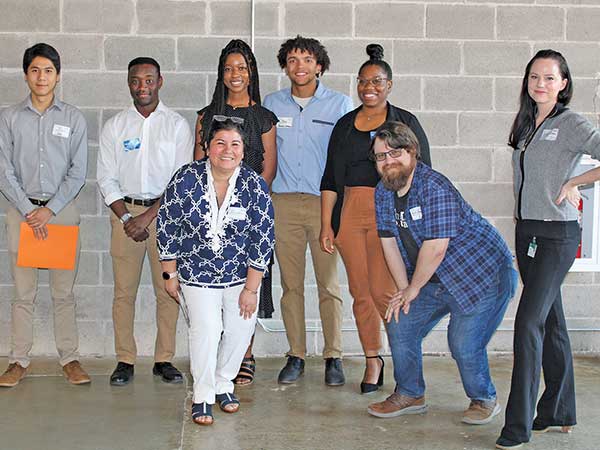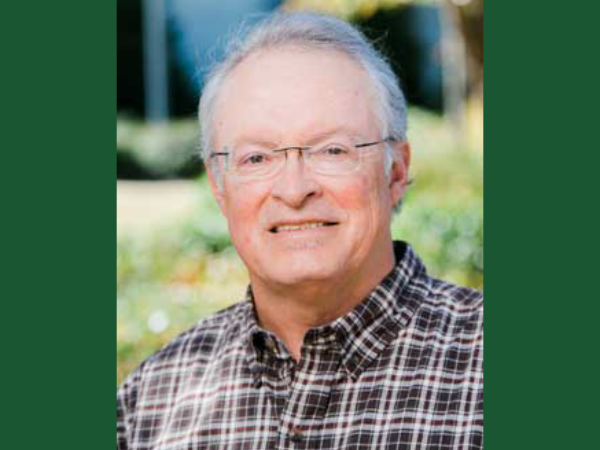 From left to right: Chattada (Pi ) Viriyaphap, Bryce Hampton, Emma Bocanegra (front), Dallas Blackwell, Philip Hyde, Laquandria Leatherwood, David Hedrick (project data guide, ThinkData Solutions Inc.), and Lauren Rast. Photo credit: ThinkData Solutions, Inc.On April 14, 2023, 16 University of Alabama at Birmingham students took the stage at the Alumni Auditorium in the Hill Student Center for the second annual Magic City Data Collective (MCDC) Demo Day. During the event, the UAB students—along with students from the University of Alabama at Huntsville, Samford University, and Lawson State Community College—presented data analysis projects to an audience that included faculty members, students, community partners, and entrepreneurs.
From left to right: Chattada (Pi ) Viriyaphap, Bryce Hampton, Emma Bocanegra (front), Dallas Blackwell, Philip Hyde, Laquandria Leatherwood, David Hedrick (project data guide, ThinkData Solutions Inc.), and Lauren Rast. Photo credit: ThinkData Solutions, Inc.On April 14, 2023, 16 University of Alabama at Birmingham students took the stage at the Alumni Auditorium in the Hill Student Center for the second annual Magic City Data Collective (MCDC) Demo Day. During the event, the UAB students—along with students from the University of Alabama at Huntsville, Samford University, and Lawson State Community College—presented data analysis projects to an audience that included faculty members, students, community partners, and entrepreneurs.
For Philip Hyde, a senior studying computational physics, the experience illuminated the value of conducting work that might lead to real outcomes and change. “I found the MCDC experience to be profoundly beneficial. It gave me the opportunity to expand upon both my personal and professional development through the interaction with a real company and real data. Not only that, but the knowledge that the final product will be used for real world purposes also helped create a sense of reward and fulfillment upon completion,” said Hyde.
The MCDC launched in the summer of 2021 and is a public-private partnership between UAB, the Birmingham Business Alliance (BBA), and other local stakeholders. Through MCDC, undergraduate and graduate students take on paid projects with local employers in business, tech, education, and philanthropy to work on real-world projects that require them to use their data analysis skills. Lauren Rast, Ph.D., assistant professor in the Department of Physics, serves as the project director and principal investigator (PI) for the initiative, which receives grant funding from the U.S. Economic Development Administration (part of the U.S. Department of Commerce). She views the MCDC as a multi-faceted experience through which students gain skills and a better understanding of how their work can impact the community.
“I think it’s important when we teach our students data analysis, data science, and any data-driven discipline that they also get the side of data that is civic, and that they’re making a contribution to the public space,” said Rast. “That seemed to be the thing that impacted the students the most.”
The April Demo Day featured the second official cohort for the MCDC. MCDC is supported by several businesses and organizations in Birmingham, including the Birmingham Business Alliance, Landing, Prosper, and ThinkData Solutions, Inc. The second cohort received both sponsorship and data from the Public Affairs Research Council of Alabama (PARCA), a nonprofit organization that works to inform and improve the decision making of state and local leaders in Alabama through objective research and analysis. PARCA provided the students with a range of data sets all focused on a common issue: education in Alabama.
“It’s one thing to read about and study the generalities from textbooks and journal articles, but it is an entirely different experience to dig into the nitty-gritty of real-world observations, where messy, contrary data points humble one’s confidence about the precision of policy-making assumptions,” said Joe Adams, Ph.D., research coordinator for PARCA. “It’s always better to examine outcome data to see how well our expectations match reality. With the understanding that comes with that experience, wiser policies can be crafted, grounded in a better understanding of reality. Data analysis can change policy conversations.”
“I think it became very clear where the needs are in public education in the state of Alabama… and that’s something they can take with them as future leaders,” said Rast.
The students in this MCDC cohort formed four teams to analyze the data, and they pursued the following projects: School Systems Budgets and School Performance; Failing School Performance, School Budgets, and County Population Demographics; School System Budget Tool; and School Performance Comparison Tool. Within each team, students brought varied perspectives, experiences, and disciplinary interests, ranging from computational physics to economics to world languages. For Rast, it is important to make sure the program is inclusive and welcoming to a diverse group of students.
“The people who work in STEM and work in data really shape our future,” said Rast. “It’s very important that when students are doing data science that they have diverse perspectives, so that as the world is shaped it is shaped by a wide variety of people. Diverse problem solvers are better problem solvers.”
After two successful cohorts, Rast is looking to the future with expanded goals in mind. Specifically, she hopes to reach more students with hands-on data analysis projects through a new course in the Blazer Core (titled “Community Data Research”) and further build out data infrastructure for the city of Birmingham. In addition, she aims to continue aligning the MCDC project with the labor force needs of the community and prepare her students for the opportunities and challenges presented by the Fourth Industrial Revolution. And, given the experience of her most recent group of students, her approach appears to be working.
“My experience with the MCDC and PARCA has demonstrated to me the influential role of data in shaping and enhancing public education in Alabama,” said Dallas Blackwell, a public health major who participated in the second cohort of MCDC. “Through data analysis, I witnessed the potential for impactful change and gained invaluable skills in collaboration and problem-solving as well as analysis tools like Tableau and Microsoft Power BI. This experience has enriched my career prospects and instilled a sense of purpose and passion for data-driven solutions in me."


